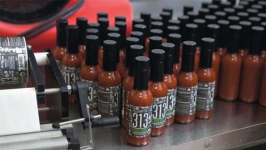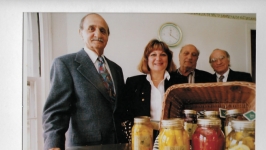Brede's Horseradish Has Deep Roots in Detroit
In a sunny, well-scrubbed office on Detroit’s northwest side, Mike and Sue Brede continue their family tradition amid the presence of a constant companion: a pleasant pinch of vinegar in the air. Distilled vinegar is a key ingredient in their third-generation business processing horseradish, the potent herb with the curious name.
Brede Foods has deep roots. In 1923, Mike’s grandfather, Edwin Brede, began preparing and selling horseradish in downtown Detroit, where Cobo Center now stands.
Longevity applies to the company and to the product, an Old World condiment reputed to combat cancer, clear complexions, calm colds and control cholesterol. The Bredes, a fit-looking couple with two grown sons, may be a testament to that medicinal folklore. “We’re actually 105 years old,” Mike says.
Horseradish humor runs in the family. During the 1970s oil embargo, Mike’s father, John Brede, now 85 and retired, brandished a bumper sticker on his car that read, “Beat the heating crisis. Eat horseradish.”
Horseradish is still hot, even extra hot in some Brede products, thanks to added mustard oil, which is extraordinarily intense in its pure, concentrated form. Brede’s extra-hot prepared horseradish is so popular in local markets and so coveted by Polish “old-timers,” the company scrambles to meet the demand, Mike says.
Aside from the hot and healthful properties of their main ingredient, it may be the work that keeps the Bredes and their enterprise vibrant. The company grew 27% in the past two years and they now supply about half the country and also sell to Thailand.
Their kosher-only (and kosher for Passover) lineup includes four mustards and cocktail, tartar and horseradish sauces—all well suited to the heftier foods of fall and winter. And the call for football-brunch Bloody Marys has metro Detroiters stocking a mandatory jar of hometown horseradish on the refrigerator shelf.
Horseradish—a mainstay in English, German and Slavic cooking and a tradition on Passover and Easter tables—is an acquired taste for some. In Eastern European households, however, the piquant perennial is a mainstay crop in backyard gardens.
At Brede Foods, the crop arrives on 600-pound pallets of shrink-wrapped raw roots delivered primarily from a farm near St. Louis, where the Mississippi River created optimal soil conditions.
The fresh roots are loaded into a large drum and tumble-washed before riding a conveyer to the grinder, where vinegar is added, followed by the addition of salt and mustard oil in the mixing tank. Prepared horseradish is usually shipped the same day it’s bottled. “We want it in stores as fresh as possible,” Mike says.
In 2000, Brede created a barbecue sauce, including a private-label, special “Hemi” brand for Dodge dealers. “I live and breathe barbecue sauce,” Sue says. “Mike likes horseradish on everything.” Sue, who didn’t know what horseradish was before meeting her future husband at Michigan State University, now dishes condiment tips. She suggests making a simple spread of equal parts mustard, sour cream and prepared horseradish. “It’s delightful on sandwiches,” she says.
Another insider tidbit: Try the pulled-pork pierogis sold at Srodek’s Market in Hamtramck and Sterling Heights. “They’re made with Brede’s barbecue sauce,” she says. “They’re just the best.”
Learn more at BredeFoods








